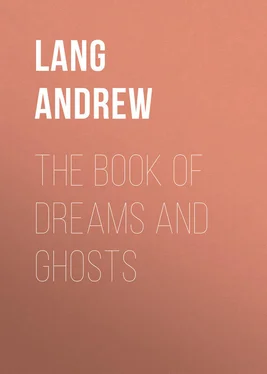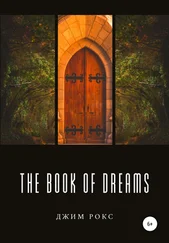Andrew Lang - The Book of Dreams and Ghosts
Здесь есть возможность читать онлайн «Andrew Lang - The Book of Dreams and Ghosts» — ознакомительный отрывок электронной книги совершенно бесплатно, а после прочтения отрывка купить полную версию. В некоторых случаях можно слушать аудио, скачать через торрент в формате fb2 и присутствует краткое содержание. Жанр: foreign_antique, foreign_prose, на английском языке. Описание произведения, (предисловие) а так же отзывы посетителей доступны на портале библиотеки ЛибКат.
- Название:The Book of Dreams and Ghosts
- Автор:
- Жанр:
- Год:неизвестен
- ISBN:нет данных
- Рейтинг книги:4 / 5. Голосов: 1
-
Избранное:Добавить в избранное
- Отзывы:
-
Ваша оценка:
- 80
- 1
- 2
- 3
- 4
- 5
The Book of Dreams and Ghosts: краткое содержание, описание и аннотация
Предлагаем к чтению аннотацию, описание, краткое содержание или предисловие (зависит от того, что написал сам автор книги «The Book of Dreams and Ghosts»). Если вы не нашли необходимую информацию о книге — напишите в комментариях, мы постараемся отыскать её.
The Book of Dreams and Ghosts — читать онлайн ознакомительный отрывок
Ниже представлен текст книги, разбитый по страницам. Система сохранения места последней прочитанной страницы, позволяет с удобством читать онлайн бесплатно книгу «The Book of Dreams and Ghosts», без необходимости каждый раз заново искать на чём Вы остановились. Поставьте закладку, и сможете в любой момент перейти на страницу, на которой закончили чтение.
Интервал:
Закладка:
In dreams, time and space are annihilated, and two severed lovers may be made happy. In dreams, amidst a grotesque confusion of things remembered and things forgot, we see the events of the past (I have been at Culloden fight and at the siege of Troy); we are present in places remote; we behold the absent; we converse with the dead, and we may even (let us say by chance coincidence) forecast the future. All these things, except the last, are familiar to everybody who dreams. It is also certain that similar, but yet more vivid, false experiences may be produced, at the word of the hypnotiser, in persons under the hypnotic sleep. A hypnotised man will take water for wine, and get drunk on it.
Now, the ghostly is nothing but the experience, when men are awake, or apparently awake, of the every-night phenomena of dreaming. The vision of the absent seen by a waking, or apparently waking, man is called “a wraith”; the waking, or apparently waking, vision of the dead is called “a ghost”. Yet, as St. Augustine says, the absent man, or the dead man, may know no more of the vision, and may have no more to do with causing it, than have the absent or the dead whom we are perfectly accustomed to see in our dreams. Moreover, the comparatively rare cases in which two or more waking people are alleged to have seen the same “ghost,” simultaneously or in succession, have their parallel in sleep, where two or more persons simultaneously dream the same dream. Of this curious fact let us give one example: the names only are altered.
THE DOG FANTI
Mrs. Ogilvie of Drumquaigh had a poodle named Fanti. Her family, or at least those who lived with her, were her son, the laird, and three daughters. Of these the two younger, at a certain recent date, were paying a short visit to a neighbouring country house. Mrs. Ogilvie was accustomed to breakfast in her bedroom, not being in the best of health. One morning Miss Ogilvie came down to breakfast and said to her brother, “I had an odd dream; I dreamed Fanti went mad”.
“Well, that is odd,” said her brother. “So did I. We had better not tell mother; it might make her nervous.”
Miss Ogilvie went up after breakfast to see the elder lady, who said, “Do turn out Fanti; I dreamed last night that he went mad and bit”.
In the afternoon the two younger sisters came home.
“How did you enjoy yourselves?” one of the others asked.
“We didn’t sleep well. I was dreaming that Fanti went mad when Mary wakened me, and said she had dreamed Fanti went mad, and turned into a cat, and we threw him into the fire.”
Thus, as several people may see the same ghost at once, several people may dream the same dream at once. As a matter of fact, Fanti lived, sane and harmless, “all the length of all his years”. 3 3 Story received from Miss – ; confirmed on inquiry by Drumquaigh.
Now, this anecdote is credible, certainly is credible by people who know the dreaming family. It is nothing more than a curiosity of coincidences; and, as Fanti remained a sober, peaceful hound, in face of five dreamers, the absence of fulfilment increases the readiness of belief. But compare the case of the Swithinbanks. Mr. Swithinbank, on 20th May, 1883, signed for publication a statement to this effect: —
During the Peninsular war his father and his two brothers were quartered at Dover. Their family were at Bradford. The brothers slept in various quarters of Dover camp. One morning they met after parade. “O William, I have had a queer dream,” said Mr. Swithinbank’s father. “So have I,” replied the brother, when, to the astonishment of both, the other brother, John, said, “I have had a queer dream as well. I dreamt that mother was dead.” “So did I,” said each of the other brothers. And the mother had died on the night of this dreaming. Mrs. Hudson, daughter of one of the brothers, heard the story from all three. 4 4 Phantasms of the Living , ii., 382.
The distribution of the fulfilled is less than that of the unfulfilled dream by three to five. It has the extra coincidence of the death. But as it is very common to dream of deaths, some such dreams must occasionally hit the target.
Other examples might be given of shared dreams: 5 5 To “send” a dream the old Egyptians wrote it out and made a cat swallow it!
they are only mentioned here to prove that all the waking experiences of things ghostly, such as visions of the absent and of the dead, and of the non-existent, are familiar, and may even be common simultaneously to several persons, in sleep . That men may sleep without being aware of it, even while walking abroad; that we may drift, while we think ourselves awake, into a semi-somnolent state for a period of time perhaps almost imperceptible is certain enough. Now, the peculiarity of sleep is to expand or contract time, as we may choose to put the case. Alfred Maury, the well-known writer on Greek religion, dreamed a long, vivid dream of the Reign of Terror, of his own trial before a Revolutionary Tribunal, and of his execution, in the moment of time during which he was awakened by the accidental fall of a rod in the canopy of his bed, which touched him on the neck. Thus even a prolonged interview with a ghost may conceivably be, in real time, a less than momentary dream occupying an imperceptible tenth of a second of somnolence, the sleeper not realising that he has been asleep.
Mark Twain, who is seriously interested in these subjects, has published an experience illustrative of such possibilities. He tells his tale at considerable length, but it amounts to this: —
MARK TWAIN’S STORY
Mark was smoking his cigar outside the door of his house when he saw a man, a stranger, approaching him. Suddenly he ceased to be visible! Mark, who had long desired to see a ghost, rushed into his house to record the phenomenon. There, seated on a chair in the hall, was the very man, who had come on some business. As Mark’s negro footman acts, when the bell is rung, on the principle, “Perhaps they won’t persevere,” his master is wholly unable to account for the disappearance of the visitor, whom he never saw passing him or waiting at his door – except on the theory of an unconscious nap. Now, a disappearance is quite as mystical as an appearance, and much less common.
This theory, that apparitions come in an infinitesimal moment of sleep, while a man is conscious of his surroundings and believes himself to be awake was the current explanation of ghosts in the eighteenth century. Any educated man who “saw a ghost” or “had a hallucination” called it a “dream,” as Lord Brougham and Lord Lyttelton did. But, if the death of the person seen coincided with his appearance to them, they illogically argued that, out of the innumerable multitude of dreams, some must coincide, accidentally, with facts. They strove to forget that though dreams in sleep are universal and countless, “dreams” in waking hours are extremely rare – unique, for instance, in Lord Brougham’s own experience. Therefore, the odds against chance coincidence are very great.
Dreams only form subjects of good dream-stories when the vision coincides with and adequately represents an unknown event in the past, the present, or the future. We dream, however vividly, of the murder of Rizzio. Nobody is surprised at that, the incident being familiar to most people, in history and art. But, if we dreamed of being present at an unchronicled scene in Queen Mary’s life, and if, after the dream was recorded, a document proving its accuracy should be for the first time recovered, then there is matter for a good dream-story. 6 6 See “Queen Mary’s Jewels” in chapter ii.
Again, we dream of an event not to be naturally guessed or known by us, and our dream (which should be recorded before tidings of the fact arrive) tallies with the news of the event when it comes. Or, finally, we dream of an event (recording the dream), and that event occurs in the future. In all these cases the actual occurrence of the unknown event is the only addition to the dream’s usual power of crumpling up time and space.
Интервал:
Закладка:
Похожие книги на «The Book of Dreams and Ghosts»
Представляем Вашему вниманию похожие книги на «The Book of Dreams and Ghosts» списком для выбора. Мы отобрали схожую по названию и смыслу литературу в надежде предоставить читателям больше вариантов отыскать новые, интересные, ещё непрочитанные произведения.
Обсуждение, отзывы о книге «The Book of Dreams and Ghosts» и просто собственные мнения читателей. Оставьте ваши комментарии, напишите, что Вы думаете о произведении, его смысле или главных героях. Укажите что конкретно понравилось, а что нет, и почему Вы так считаете.












